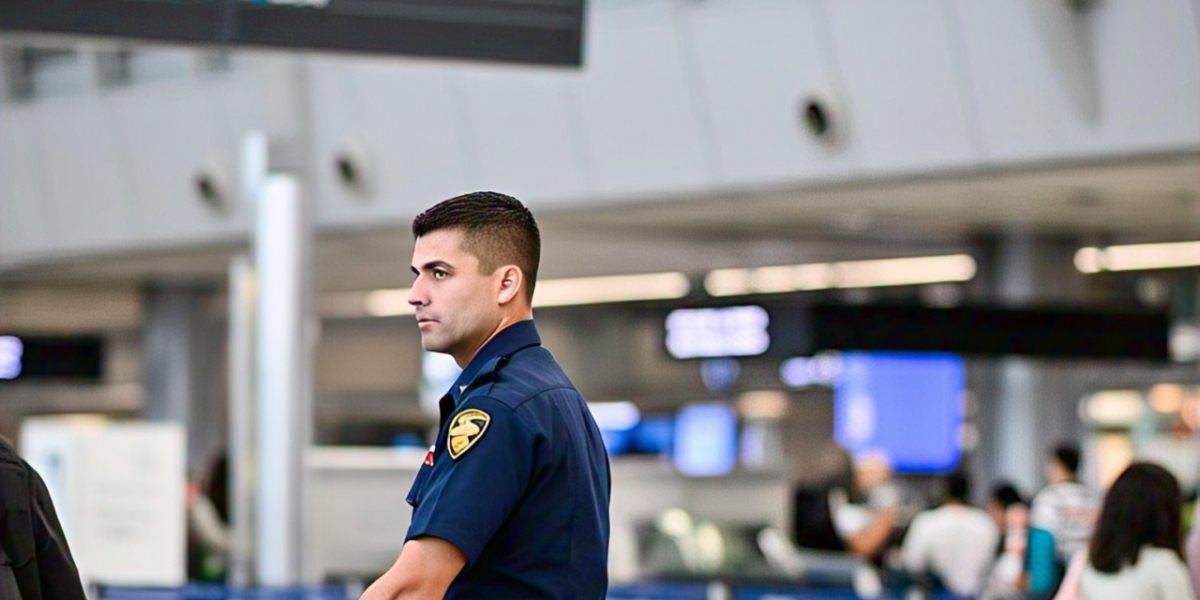The Vital Role of Airport Security
Airports are complex infrastructures where safety is a top priority. With thousands of people passing through daily, ensuring the safety of passengers, staff, and infrastructure is non-negotiable. This is where the presence of professional security guards becomes indispensable. Their duties go far beyond simply standing at entrances; they monitor, patrol, and respond to a variety of threats, ensuring smooth operations. In today's global context, where threats can be both internal and external, airports rely heavily on trained security professionals. From identifying suspicious behavior to enforcing protocols, their presence significantly reduces the chances of security breaches. Their collaboration with law enforcement and internal airport teams adds another layer of preparedness. The trust passengers place in an airport's safety begins with visible and effective security measures, most of which are delivered by on-ground security personnel.
Monitoring Entry and Exit Points
One of the most important responsibilities of airport security guards is to control and monitor all entry and exit points. Airports have several restricted and public areas, and ensuring that only authorized personnel enter secure zones is crucial. Security guards check IDs, scan baggage, and validate boarding passes to maintain a safe perimeter. This access control system not only deters unauthorized access but also streamlines passenger flow. Guards must stay vigilant to spot any attempt to bypass security protocols. They are trained to respond swiftly if a breach occurs, minimizing risks and restoring order. Their familiarity with airport layouts and protocols ensures that the flow of people doesn’t compromise security. By being stationed at critical access points, security guards serve as the first line of defense in safeguarding airport premises and passenger safety.
Crowd Management During Peak Hours
Airports often experience peak traffic during holidays and special travel seasons. During these high-traffic periods, crowd control becomes a challenging yet essential task. Security guards play a crucial role in managing large groups of passengers, ensuring that everyone moves smoothly through checkpoints without causing unnecessary delays or panic. Their ability to remain calm under pressure helps in preventing chaos. With clear instructions and controlled movements, guards can maintain order even in tense situations such as flight cancellations or delays. This responsibility involves not only monitoring queues but also identifying individuals who may be behaving suspiciously. Their visible presence reassures passengers while also acting as a deterrent to potential threats. In managing crowds, guards help maintain airport efficiency and uphold safety standards, ensuring that both passengers and staff remain secure.
Surveillance Through Advanced Technologies
Modern airports rely on a blend of human surveillance and technological systems. Security guards are trained to operate and monitor closed-circuit television (CCTV) systems and other surveillance equipment. They must stay alert for any irregular or suspicious behavior that could signal a security threat. Real-time footage allows for swift action if an incident occurs. Through camera feeds, guards can track movement across terminals, observe baggage areas, and identify potential problems long before they escalate. This synergy of manpower and technology provides a comprehensive security solution. The effectiveness of this system hinges on trained eyes that can interpret visual cues and patterns that machines might miss. Thus, the presence of skilled guards behind the monitors is just as crucial as the cameras themselves in protecting the airport environment.
Baggage Screening and Threat Detection
Another essential function of airport security is inspecting luggage for prohibited items. Security guards assist with baggage screening by working alongside screening machines and personnel. Their job includes visually checking luggage and interpreting scanner images. They are trained to spot suspicious items, respond accordingly, and escalate the issue when necessary. This layer of inspection acts as a safeguard against weapons, drugs, or explosives being transported. In cases where passengers are found carrying restricted items, guards handle the situation professionally and according to regulations. Their involvement ensures passengers feel safe while knowing their luggage is being inspected carefully. Their swift action during alerts prevents further risks and keeps the airport running smoothly. The presence of guards around screening areas also reinforces a zero-tolerance approach to security threats.
Coordinating with Emergency Services
In times of emergency—whether medical, technical, or related to a security threat—security guards are often among the first responders. They are trained in emergency protocols and crisis management, allowing them to act decisively. Whether it’s guiding people to safety during an evacuation or providing first aid before paramedics arrive, their intervention is vital. Their ability to stay calm and follow standard procedures can save lives and prevent injuries. Communication between security personnel and emergency responders must be seamless, and guards often facilitate this connection. In large airports, this role is even more critical due to the size and number of people involved. A well-coordinated emergency response underscores the importance of having professional security services in place. Learn more about expertly trained professionals by visiting one of Australia’s trusted security providers.
Responding to Suspicious Behavior
Observing and identifying suspicious activity is a skill that every airport security guard must possess. Trained in behavioral analysis, guards can spot nervous behavior, excessive loitering, or attempts to avoid security checks. When such behavior is noticed, guards approach the situation discreetly, questioning the individual or notifying higher authorities if necessary. Their ability to detect and react early prevents potential threats from becoming incidents. This proactive role not only protects people within the airport but also reassures them. In a bustling environment like an airport, early detection is crucial. Security guards must rely on experience, intuition, and training to differentiate between unusual and dangerous behavior. Their visible presence discourages harmful intentions and promotes a secure environment for all travelers and employees.
Ensuring Safety on the Tarmac and Hangar Areas
Airport security isn’t limited to passenger terminals. Security guards also patrol tarmac and hangar areas where aircraft are parked, loaded, and maintained. These restricted zones require continuous surveillance due to their vulnerability. Guards monitor fuel trucks, maintenance crews, and cargo handling to ensure no unauthorized individuals gain access. A breach in these areas could have catastrophic consequences. Their job includes checking identification, inspecting vehicles, and escorting personnel when needed. These areas are often less crowded, which means any suspicious movement is more noticeable—and must be addressed immediately. By safeguarding these high-risk zones, security guards ensure the overall security integrity of the airport and contribute to aviation safety.
Assisting with Lost and Found Services
While their primary focus is safety, security guards also provide assistance with customer service tasks, including managing lost and found services. They help passengers who may have misplaced belongings, guiding them through the process of recovery. They also ensure that unattended items are reported and investigated promptly to rule out security risks. The presence of guards helps passengers feel supported, especially in stressful situations like losing valuables during travel. Their responsiveness and empathy in such cases reflect the human side of airport security work. They also coordinate with other departments to reunite passengers with their belongings safely. Through these services, security guards enhance the passenger experience while maintaining high safety standards.
Preventing Theft and Vandalism
Airports, like any large public space, are susceptible to theft and property damage. Security guards play a critical role in deterring and addressing such incidents. They patrol duty-free shops, luggage claim areas, and parking zones to monitor any unusual behavior. Their visibility alone often discourages criminal activity. When theft or vandalism occurs, guards step in to resolve the issue, retrieve stolen items, and report to airport police. In doing so, they preserve the airport's reputation and ensure a safe environment. This kind of incident prevention is a key aspect of airport operations. Guards’ familiarity with airport layouts and routines helps them spot when something is out of place or needs intervention.
Assisting During Check-In and Boarding
Security guards assist in managing orderly lines and procedures during check-in and boarding. While airline staff focus on documentation, guards oversee the general behavior of passengers, ensuring that the area remains secure and orderly. This support reduces delays and confusion, especially during peak travel times. Guards also help maintain a calm environment when unexpected situations arise, such as overbooking or weather delays. Their training in conflict resolution allows them to manage tense moments without escalation. By staying alert and approachable, they contribute to a smooth boarding experience while keeping a watchful eye on potential security issues. You can explore how static security guards support high-security environments through dedicated security solutions for Australian airports.
Enhancing Traveler Confidence
The presence of uniformed security guards enhances traveler confidence. People feel more at ease knowing that trained professionals are monitoring and protecting the space. This trust is vital in ensuring a pleasant travel experience. Guards who are visible, professional, and helpful make a positive impression on passengers. Their calm demeanor and quick response to inquiries or incidents create an atmosphere of assurance. Travelers, especially those unfamiliar with airports or those traveling internationally, appreciate having security personnel available to assist and guide them. By reinforcing safety through both presence and action, security guards contribute directly to customer satisfaction.
Training and Certification Requirements
Becoming an airport security guard requires specialized training and certifications. These include first aid, conflict resolution, surveillance operation, and emergency response. Continuous training is essential as threats evolve over time. Guards must stay updated with the latest security protocols, laws, and equipment usage. In addition to technical skills, soft skills like communication and empathy are also emphasized during training. A well-trained guard can handle emergencies, provide excellent customer service, and maintain order—all within the same shift. This adaptability is what makes them invaluable in an airport setting.
Conclusion: Security Guards Are a Critical Asset
Airport operations depend heavily on the presence and performance of professional security guards. From surveillance and baggage checks to emergency response and passenger assistance, their contributions are multifaceted. Their presence not only prevents threats but also ensures smooth operations. With evolving global threats, the importance of security guards in aviation safety continues to grow. Investing in their training and maintaining high standards is essential for any airport aiming to offer a secure travel experience. As airports become more complex, the demand for skilled, alert, and compassionate security personnel will only increase.
FAQs
1. What are the main duties of airport security guards?
They manage access points, monitor CCTV systems, assist passengers, and respond to emergencies.
2. Do airport security guards receive special training?
Yes, they undergo training in threat detection, surveillance, emergency response, and customer service.
3. How do security guards handle suspicious activities?
They observe behavior, question individuals, and escalate the situation to authorities if needed.
4. Are guards involved in passenger assistance?
Absolutely, they help with directions, lost items, and even manage boarding queues.
5. What role do they play in emergencies?
They’re first responders, guiding evacuations, offering first aid, and coordinating with emergency teams.
6. Why is their presence important for travelers?
It reassures passengers, deters threats, and ensures a smooth, safe airport experience.



